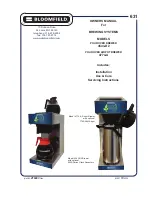
Speidel’s Master Brewer
Page 13 of 26
the activity of organisms in the beer yeast, which convert the fermentable sugar into
alcohol and carbonic acid. The cask is sealed with a lid and a fermenting bung
immediately after adding the yeast. Sulphurous acids should be filled in the fermenting
bung, so that no foreign organisms can enter the cask. You must also bear in mind that
you should be working in absolutely sterile conditions, in order to prevent the beer
from becoming infected with foreign organisms. The cask is never allowed to be
sealed completely: the CO
2
that arises from the fermentation can thus escape. Put the
cask in a darkened room, which has the requisite temperature for the yeast. The
fermentation of bottom-fermented beer can also take place in a refrigerator that is not
too cold, whereas top-fermented beer can be fermented at room temperature. It is
therefore suitable for the novice to begin with top-fermented beers because certainly
not everyone has an extra refrigerator available. It is particularly important to maintain
the temperature. The yeast cells can become active only slowly or even not at all when
temperatures are too low. The yeast cells can die when temperatures are too high. The
fermentation should be active 6 to 12 hours after adding the yeast: which can be easily
established when bubbles of gas escape through the fermenting bung. The fermenting
duration amounts to between 2 and 4 days. Dark flakes of yeast can occur on the
fermenting foam during the fermenting process, which can be skimmed off with a
sterilized wooden spoon. The stop cock must be cleaned immediately and disinfected
by applying sulphurous acid with swab of cotton wool, if you remove wort via the stop
cock during the main fermentation (e.g., for taking measurements with the beer
spindle), in order to prevent it from drying out and to avoid it from becoming infected
subsequently by bacteria sticking to it.
4.9
Maturation (ripening)
The sugar that remains from the main fermentation and is added afterwards, is
fermented during the subsequent fermentation or maturation – the fresh beer is
enriched with carbonic acid, which is significant for the foam’s formation and
maintenance later on: it matures to a tasty full-bodiedness. The beer is clarified
naturally during the maturation. If the fermenting activity is now set (no fermenting
gases escape), then one can commence with the decanting [i.e., bottling]. The
following preparations have to be made for this purpose: prepare the maturing
containers or bottles and thaw out the frozen wort.
Subsequent fermentation in bottles is the best possibility available to you and it is also
preferred by most hobby brewers. Further possibilities are various, pressure-resistant
containers like special 5 litre tins or appropriate beer and pressure casks. Working in
sterile conditions is always vital at this stage too. All equipment must therefore by
thoroughly cleaned and disinfected before use. The following method of procedure is
recommended when using stirrup bottles: rinse out and clean the bottles thoroughly
with warm water, in order to remove liquid and dried residues. Then put the bottles in
the oven (leave space between the bottles and remove the seals) and heat them up to
130°C. The temperature must be maintained for a maximum of 5 minutes. Leave the
bottles lying there to cool down as well. The rubber seals are disinfected separately in
boiling water. The bottles are sealed immediately after they have cooled down in order
for them to be airtight and they are then prepared for filling. This preparation should
have already taken place during the fermenting process or even earlier, so that you do
not have to work at a frantic pace on the filling day and so that you can concentrate on
the essentials. Larger bottles can also be used, in order to limit the outlay of time for
cleaning the bottles and filling them.
The thawed-out wort is now added carefully to the fresh beer in the fermenting
container about 1 to 2 hours before the filling begins. The thawed-out cooler sludge














































